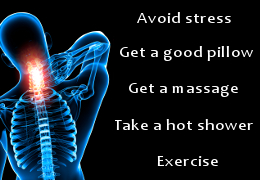More often than not, stiffness in neck is aggravated by bad posture. If this condition persists, it may well be an indication of a serious ailment. The following write-up provides information on the causes of stiff neck along with treatment and precautionary measures.

A stiff neck is a common ailment, normally harmless, that may last for a few painful hours or even days. More often than not, stiffness results from sore muscles. If you are frequently suffering from this painful condition, it's best for you to consult a physician and get to the root cause of it.
Causes
Stiffness could be caused due to a wide range of reasons. The contributory factors include:
» Sometimes, stiffness is an outcome of a head concussion.
» Meningitis and high blood pressure are serious ailments associated with it.
» Neck stiffness could also be a sign of encephalitis, which refers to inflammation of the brain. But if you experience fever, nausea and, vomiting along with the pain then it may be indicative of a simple viral illness or a more serious infection around the brain.
» If you are experiencing throbbing pain or numbness down your shoulder or into your arm then you may be suffering from herniated cervical disk. In this ailment the part of vertebra of spinal cord grows abnormally resulting in pressing against nerve.
» Stiffness can also be outcome of rheumatoid arthritis or fibromyalgia, a condition where muscles and tendons get affected. It can be also a case of degenerative cervical arthritis. Anti-inflammatory medicines like Ibuprofen and Aspirin can be used to get instant relief. Gentle heat can be applied to the sore area. Consulting your physician is always the best thing you can do.
Remedies
Normally, neck stiffness is an outcome of our poor posture and our lifestyle. Most of the time, we ourselves get so habituated of our poor posture that we gradually stiffen our necks, shoulders and backs over the period. In most cases, using a thick or fluffy pillow while sleeping is one of the prime reasons why people suffer from a stiff neck. Physical or mental stress could also tense the muscles in your neck. Here are few remedies to avoid this situation.
Avoid Stress
In today's fast-moving world, stress often causes the neck muscles and upper shoulder muscles to tighten. Relaxing your body and taking adequate breaks to warm up and exercise can help avoid stress. Use relaxation techniques to get rid of stress. Lying on the ground with your knees bent, feet on the ground, and a paperback book underneath your head can be a good starting posture. Imagine your body relaxing from head to toe and engage in deep breathing.
Check Bed and Pillow
In most of the cases this is easiest thing to do, that'll bring quick comfort. A mattress or bed that doesn't provide the necessary support is a common cause of stiffness and pain in the neck. Even an old and hard pillow can lead to a sore neck. Remember, you do spend one-third of life in bed so it's very essential to provide optimum support to the body. People from old age group are more susceptible to neck pain caused by cold exposure. So don't keep the bedroom windows open.
Massage
An oil massage serves as one to of the best tools to get quick relief. Although it serves as a temporary solution, it is very helpful to get an instant relief. Expert massage therapists know the anatomy well enough to know which muscle should be focused on. You can also learn the same massage.
Painkillers
This remedy also forms a temporary solution of the problem but can give a quick relief and ease your pain. Painkillers like aspirin should be tried, to reduce the swelling and inflammation of neck. It has to be understood that these painkillers or muscle relaxants can only mask the problems but will not address the underlying cause.
Hot Shower
A hot shower can also help to relieve the tension in the neck muscles. The hot shower gently massages the neck muscle by allowing heat to seep into the muscles.
Exercises
Isotonic exercises strengthen the muscles of neck in upper shoulder region. Thus minimizing the possibility of injury in this area. Neck rotation and neck flexion exercises increase flexibility and reduce the probability of a stiff neck condition.
It's important that you engage in exercise regularly so as to prevent a stiff back or neck. Good posture, lots of exercise and adequate rest will keep you fit and ready to take on life.
Disclaimer:
The information provided in this article is solely for educating the reader. It is not intended to be a substitute for the advice of a medical expert.


 A stiff neck is a common ailment, normally harmless, that may last for a few painful hours or even days. More often than not, stiffness results from sore muscles. If you are frequently suffering from this painful condition, it's best for you to consult a physician and get to the root cause of it.
A stiff neck is a common ailment, normally harmless, that may last for a few painful hours or even days. More often than not, stiffness results from sore muscles. If you are frequently suffering from this painful condition, it's best for you to consult a physician and get to the root cause of it.